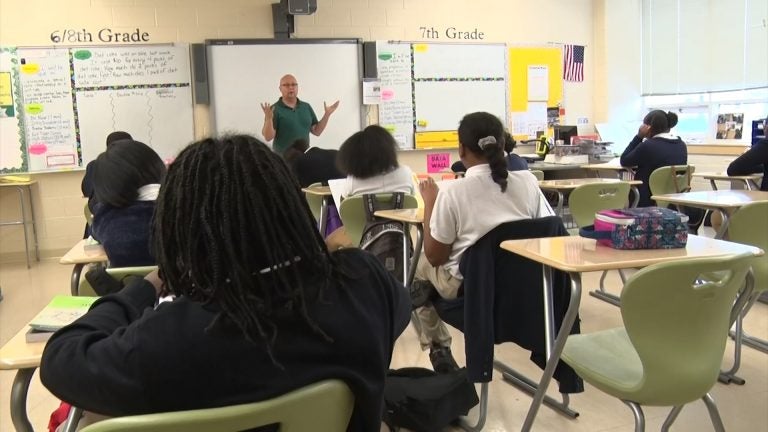Sex ed advocates urge N.J. schools to drop emphasis on abstinence
Thrive NJ Coalition’s ‘report card’ gives New Jersey sex ed programs just a ‘C’ grade, saying schools should spend more time on the subject.

A new report from the Thrive NJ Coalition found three-quarters of parents and students want more time spent on sex ed in schools. (Courtesy of NJTV News)
This article originally appeared on NJ Spotlight.
—
Should New Jersey schools be required to stress abstinence in their sex-education programs, and are they helping students by highlighting the failure rate of contraceptives? Should they be spending more time on sex ed in the classroom, and are they doing a good job on the subject overall?
A new “report card” on sex-ed policy and implementation — compiled by a coalition of advocates including Planned Parenthood and ACLU — gave the state’s sex-ed policy only a “C” grade, noting it should dial back the state-mandated emphasis on abstinence, and avoid scaring teens by telling them that contraceptives may not work.
The report, which the Thrive NJ Coalition, made up of 21 advocacy groups, issued on Wednesday, found three-quarters of parents and students want more time spent on sex ed in schools, that teachers want more training in it, and that schools are approaching the subject in a way that differs from district to district and even from teacher to teacher.
“Given how important sex education is to young people’s health, lives, and futures, it only makes sense to dedicate ample time to such an essential subject in school,” the report stated.
It noted that New Jersey was the first state in the country to require comprehensive sex ed in public schools, starting in 1981. Although New Jersey schools are not required to teach “abstinence only until marriage,” a policy followed by some other states, they must still emphasize abstinence, highlight the failure rate of contraceptives, and give parents the right to opt their kids out of sex ed in school.
Harmful to teens
Telling teens to “just say no” is harmful because it withholds information from them about sexuality, the report stated. It noted that the incidence of sexually transmitted infections is higher in states that follow “abstinence only until marriage” or a similar policy called “sexual risk avoidance education” than in states such as New Jersey that don’t have those requirements.
The report placed the abstinence policy at the top of its list of needed changes, saying it “can still shame young people and be ineffective at preventing risk behaviors.” It also accused state policy of failing to guide schools on how to tell students about abstinence.
Susie Wilson, who helped to originate the state’s sex-ed policy as a member of the State Board of Education in 1979, and later had a hand in implementing it, welcomed the report, and endorsed its call to de-emphasize abstinence.
More problematic, she said, is the requirement to stress the failure rate of contraceptives, a policy that she said is at odds with the evidence of a low failure rate, and reflects pressure from the federal government when the policy was put in place. “I do think it’s misleading,” she said. “Most contraception works because people are taught how to use it properly.
“If you keep saying, ‘The condom’s going to break,’ eventually the kids are going to say, ‘Why should I bother?’” she said.
Wilson said the authors should not have assigned an overall letter grade to the state of sex ed, but she welcomed the report as a timely examination of policy.
“When you have public policies, and they don’t get evaluated, you really don’t know what you’ve got,” she said. “It’s very useful, and I applaud the groups who are behind it.”
Health, physical education review
Michael Yaple, a spokesman for the state Department of Education, said it has not yet evaluated the report but noted that officials are starting to review some standards such as health and physical education, which includes sex ed.
“Anyone who wants to provide input into New Jersey’s academic standards will find this is an opportune time,” he said. “Public comment on the standards is expected to take place around February and March.”
The department is presenting updates on health and physical education standards, among others, at State Board of Education meetings in January and February, Yaple said, noting that some standards — such as the requirement on teaching abstinence — that are set in law can only be addressed by legislators, he said.
The report gave state law on sex ed a “B” grade but called on the Legislature to remove the requirements on abstinence and contraceptive failure.
Planned Parenthood Action Fund of New Jersey, a group that contributed to the report, said the policies on abstinence and the failure rate of contraceptives are potentially damaging to students.
“Scaring and stigmatizing young people is not only ineffective, it’s also dangerous,” said Kaitlyn Wojtowicz, vice president of public affairs for the fund, in a statement. “All students have the right to medically accurate, comprehensive sexuality education that gives them the knowledge they need to make healthy decisions.”
School districts have a great deal of discretion on how they implement legal requirements on sex ed, resulting in wide variation in how they teach it, the report stated. Only half of schools responded when asked which curriculum or textbooks they followed on sex ed, and 55% said they didn’t know if their district has a specific written policy on the subject.
Uniform state standards
The report gave schools a “C” grade on curricula and consistency, saying students would benefit from uniform standards across the state.
But the report awarded an “A” grade to parental involvement in their children’s sex ed, finding that more than 90% wanted their kids to learn about consent, sexually transmitted infections, and safer sex as part of school curricula.
Still, parents were much less confident that their children were actually being taught about sexual health issues in school. Only 29% thought that children were learning about condom use in sex-ed classes, as opposed to the 89% who wanted the topic taught. And about a third of parents expressed confidence that schools were teaching safer sex, well below the 92% that wanted instruction.
Among students, only 56% said their sex-ed classes were useful, the report said, using responses from eighth-graders to recent high-school graduates from all 21 New Jersey counties. It gave schools only a “C” grade for “inconsistent work” on sex ed, and called on the Legislature and the state DOE to provide more consistent standards.
On the LGBTQ community, the report stated the state should provide appropriate content guidelines for sexuality. It found that only a third of students said their sex ed classes covered LGBTQ issues.
Although sex ed is well provided in many New Jersey schools, it can also be under-funded and politicized, the report noted. If effectively delivered, it can reduce unwanted pregnancies and sexually transmitted infections while delaying sexual initiation and improving academic achievement.
WHYY is your source for fact-based, in-depth journalism and information. As a nonprofit organization, we rely on financial support from readers like you. Please give today.




